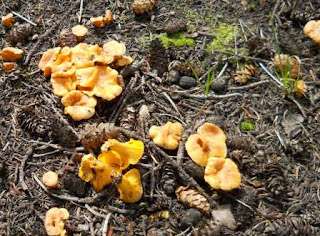Several decades ago, flocked Christmas trees were all the rage. In the Old West, people went for the real thing. You can probably tell from this picture that they're my family's favorite, too. We treasure times spent together finding and harvesting each year's perfect Engleman Spruce. For us, as it is for most, Christmas is about home and family. Yet, those were scarce in the Old West, leaving the holiday to start in slow and meager fashion despite fancy traditions already set back East.
Lieutenant Zebulon Montgomery Pike and 24 soldiers left Belle Fontaine (near St. Louis, Missouri) on July 15, 1806. The primary objective was to “ascertain the direction, extent, and navigation of the Arkansas and Red Rivers.”
Lt. Pike and his men reached the site of what is now Salida, Colorado, on December 24. Despite deep snow and the scarcity of game, the reality of impending starvation pushed a desperate hunting party out of camp Christmas Eve. The hunters returned with news of 8 buffalo killed. Jubulation filled Pike's entire party. He commented in his journal:
“We now again found ourselves all assembled together on Christmas Eve, and appeared generally to be content, although all the refreshment we had to celebrate the holiday with was buffalo meat, without salt, or any other thing whatever.”
Stormy, bitter cold weather marked Christmas Day. Men and commander huddled around fires. Zebulon Pike wrote:
“Here I must take the liberty of observing that in this situation, the hardships and privations we underwent, were on this day brought more fully to our mind. Having been accustomed in the past to some degree of relaxation; but here 800 miles from the frontiers of our country, in the most inclement season of the year; not one person clothed for the winter, many without blankets [having cut them up for socks, ect.] and now laying down at night on the snow or wet ground; one side burning whilst the other was pierced with the cold wind; this was in part the situation of the party whilst some were endeavoring to make a miserable substitute of raw buffalo hide for shoes. I will not speak of diet, as I conceive that to be benieth [sic] the serious consideration of a man on a voyage of such nature. We spent the day as agreeably as could be expected from men in our situation.”
Forty-two years later, Colonel John C. Fremont made his fourth expedition to the far West. Christmas 1848 found Col. Fremont and his men camped in high in the La Garita Range of southern Colorado. Experienced frontiersmen all, they named the pathetic log outpost they built Camp Desolation. Game had already migrated lower. Plentiful snow and freezing temperatures limited foraging. In spite of the hardships, possibly because of them, the men celebrated the holiday. Thomas E Breckenridge, a member of Fremont’s party, recorded the menu of the limited Christmas banquet:
Soup
Mule Tail
Meats
Mule Steaks, Fried Mule, Mule Chops
Boiled Mule, Stewed Mule, Scrambled Mule
Shirred Mule, French-Fried Mule, Minced Mule,
Damned Mule, Mule on Toast (without toast)
Short Ribs of Mule with Apple Sauce (without Apple Sauce)
Beverages
Snow, Snow, Water, Water
 Government funded explorations weren’t the only white men in the Rocky Mountains during the 1840’s. Mountain men discovered passes and fertile valleys the government parties missed. The fur trade spread through the Rockies. Trappers mixed with Indians. Where and when possible, the white men introduced their joy of great feasts on December 25, which the Indians dubbed “The Big Eating.” For one such Christmas celebration, James Kipp, a grizzled mountain man, planned to treat his fur traders and Indian allies to a big surprise at Fort Union, Montana. Weeks before the holiday, Kipp fattened a large heifer, a rare commodity then, for his gift of an “Eastern” delicacy. However, he received the day’s biggest surprise. A few bites of beef convinced all the other diners the “tame” meat was “too fat and downright sickening.” They returned to the lean buffalo and other wild meats which present day society has recently embraced for its health benefits. Buffalo, or bison as it’s labeled in the stores, is easy to find in western states. Elk, venison (deer), quail, pheasant, not so easy, but certainly available with a little research.
Government funded explorations weren’t the only white men in the Rocky Mountains during the 1840’s. Mountain men discovered passes and fertile valleys the government parties missed. The fur trade spread through the Rockies. Trappers mixed with Indians. Where and when possible, the white men introduced their joy of great feasts on December 25, which the Indians dubbed “The Big Eating.” For one such Christmas celebration, James Kipp, a grizzled mountain man, planned to treat his fur traders and Indian allies to a big surprise at Fort Union, Montana. Weeks before the holiday, Kipp fattened a large heifer, a rare commodity then, for his gift of an “Eastern” delicacy. However, he received the day’s biggest surprise. A few bites of beef convinced all the other diners the “tame” meat was “too fat and downright sickening.” They returned to the lean buffalo and other wild meats which present day society has recently embraced for its health benefits. Buffalo, or bison as it’s labeled in the stores, is easy to find in western states. Elk, venison (deer), quail, pheasant, not so easy, but certainly available with a little research.Life in the Old West, considered romantic now, was labor intensive with few celebratory breaks. It was natural to pause at Christmas and reflect on joys or hardships of the time, on memories of the past, and on dreams of the future. Such reflections hit harder, deeper in the back of beyond, where nothing was familiar and survival itself was difficult.
Although more people ventured west as years passed, conditions remained challenging.
Captain Randolph B Marcy wrote in 1859 of his party’s dining experience in the frontier west: “We suffered greatly for the want of salt; but by burning our mule steaks, and sprinkling a little gunpowder upon them, it did not require a very extensive stretch of the imagination to fancy the presence of both salt and pepper.” (Published in The Prairie Traveler)
In Denver, Colorado, 1888, miner Will C. Ferril wrote:
|
Mountain cabin in Fall. Not enough stamina to cross country ski in to take a pic in dead of winter. |
Whatever may be the life of the westerner, there are two occasions in the year that recall the old home life--Thanksgiving and Christmas... Imagine a point in mid-air about two miles above New York City, and you have an elevation at which over 1,000 miners in Colorado will spend the holiday season. They are shut in by snow and ice; and for months to come they will know as little about what is going on in the busy world as though they were sailors on some vessel frozen up for the winter amid iceberbs of the Arctic regions...
One Christmas I spent up on the mountainside with two or three others. There we had our holiday dinner. It was a wholesome meal, but wanted in those delicacies that a mother or a wife can best prepare.
“I wish we had some flowers for the Christmas table,” said one of the boys.
“Get out your old letters,” said one.
We all knew what he meant; for many a flower from the old home finds its way in a letter to the boys out West. One found a rose-bud, another a violet, another a daisy, and then another rose was found in a mother’s letter. Withered and faded were those tokens from the old homes, but never did the men value flowers more than we did with that withered bouquet.
“Can’t someone say grace?” said one of the boys.
“The closing lines in my mother’s letter,” said a boyish fellow, “might do.”
“Read them,” was the response that came from all.
Heads were bowed around the frugal Christmas board and the young man read.
“God bless you my son, and God bless us all.”
I then looked up and saw tears on the cheeks of the weather beaten faces.
This tale of a homesick Christmas was published in Western Yesterdays.
I punched cows up in Wyoming most of my life....I remember one Christmas when things looked mighty bleak...
I was up on Pass Creek, in northern Wyoming. I had a new partner, and we hired out to break broncs. It was bitter cold. We’d been out all day, and just getting’ inside that cabin meant a lot, even though it looked gloomier that ever...
You see, this was the twenty-fourth of December. Tomorrow was Christmas.
The first thing was a fire. The wood we’d crammed into the old box stoves at opposite corners of the cabin had burned out. The place seemed colder than it was outside. So we began shaving kindling with hands so numb we could hardly hold a knife.
I couldn’t help thinking about Christmas. This was the first one I’d ever spent in a lonely camp, a long ways from the gay celebrations of the cow towns...
Now if only I were up in Billings with [my old partner] Hank, a mug of steamin’ Tom and Jerry in my hand. The thought of that was so warm and pleasant that I didn’t notice that my new partner had lighted the kerosene lamp.
I whirled around, staring.
There in the middle of the floor was a big wooden box. The camp tender, who had made a hurried trip in there that day with the grub and supplies, had left it. There was a tag on it, addressed to us!
“Who’s it from, Jack?” he asked.
I read the names. From our bosses, in Boston. I never expected anything from them. Why, we hadn’t been working for them more’n three weeks. To think they’d remember us.
We pried off that lid in a hurry, began pullin’ out things. We was as happy as any two little boys you ever saw. Two Arctic sleepin’ bags. We wouldn’t be cold any more at night. Thick wool socks, tobacco, a big fruit cake, candy. Best of all, there was several good books.
“No, these are not the best thing,” I told my partner. “The best thing is that our bosses remembered us, two kid bronc twisters out here under the Big Horns.” I reached across for my partner’s hand. “Merry Christmas Partner.”
From Charlie Russell's 1914 Christmas card:
|
Wrong era/season. Real cowboy. |
Best wishes for your Christmas
Is all you get from me,
'Cause I aint no Santa Claus--
Don't own no Christmas tree.
But if wishes was health and money,
I'd fill your buck-skin poke,
Your doctor would go hungry
An' you never would be broke.
I used my old set of Encyclopedia Britannica for this post along with two books: Christmas in the Old West by Sam Travers and A Rocky Mountain Christmas by John H Monnett. They were located for me by Jennifer Murrell of my local library. I want to thank her for her excellent research and dedication in tracking down these books. Each was provided by an outlying library. Libraries are invaluable resources for writers; we owe a great deal to the employees, volunteers, and members. Jennifer, You Rock!
Merry Christmas and Happy New Year


















